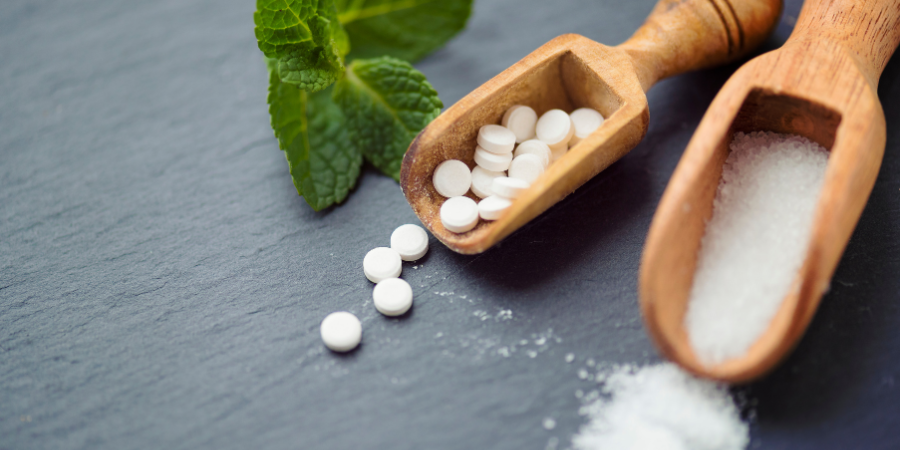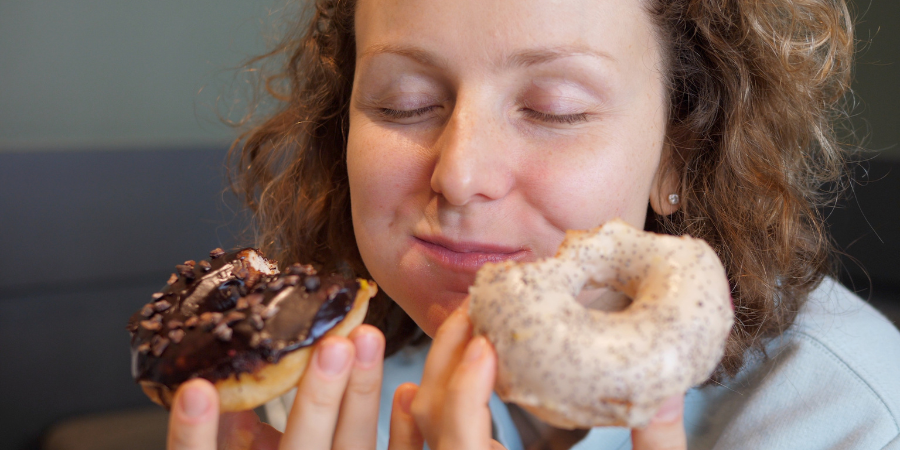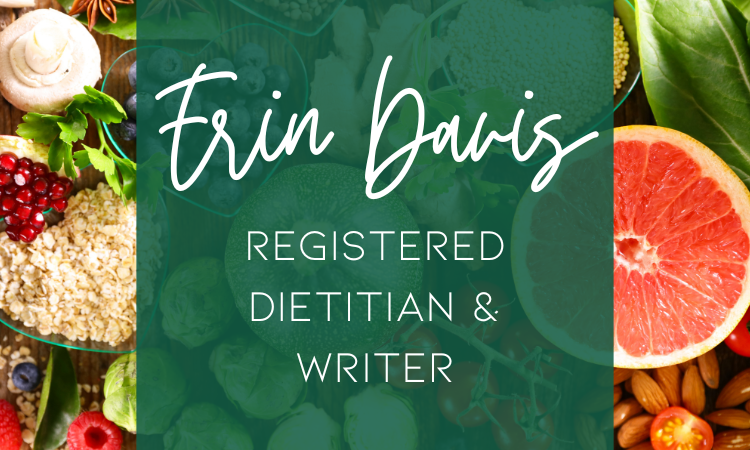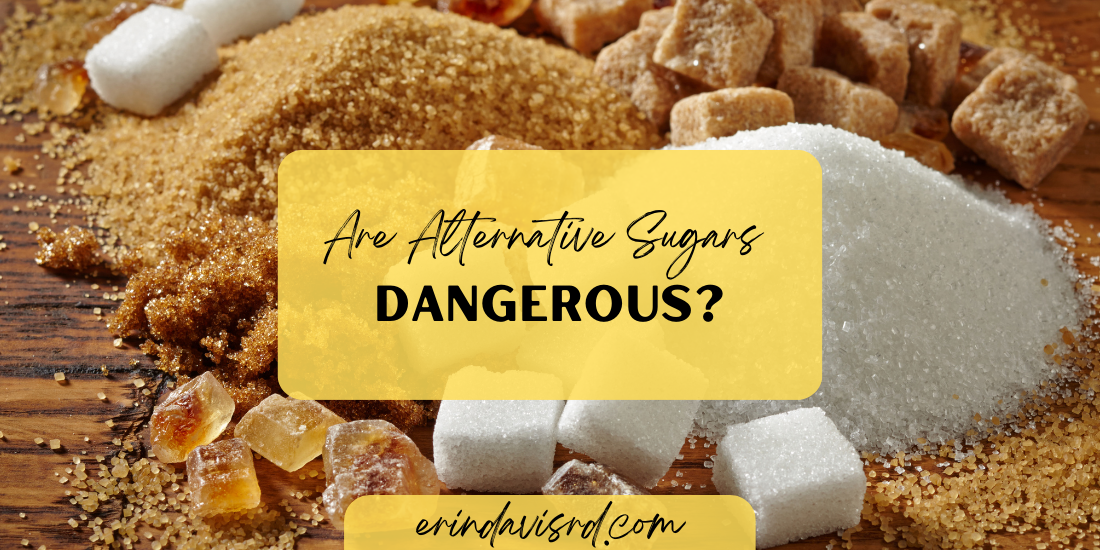Many people with diabetes rely on alternative sugars or artificial sweeteners to reduce their sugar intake. But you may be wondering if these alternatives are safe. Do they actually help lower your blood glucose or reduce calorie intake? Today I’m digging into the research to answer the question—”Are alternative sugars dangerous?”
Got a sweet tooth? Should you grab a diet soda and save yourself 140 calories, weight gain, and blood sugar spikes? It seems too good to be true, doesn’t it? But many people desiring weight loss or trying to manage diabetes choose diet products and non-sugar sweeteners.
The number of alternative sugars continues to grow. But do these alternatives do what they promise? Do they help manage diabetes or support weight loss?
If you’re new here, hi! I’m Erin, an anti-diet registered dietitian and diabetes educator specializing in weight-inclusive care. So I’m a dietitian and science nerd who absolutely despises diets—and all the mental turmoil they bring. My goal is to bring you complete peace with food and improve your health in an evidence-based way.
Let’s dive in!
What are non-sugar sweeteners?
First, let’s talk about what non-sugar sweeteners are. Non-sugar sweeteners are alternative sugars that are added to a food product to enhance the flavor—essentially taking the place of sugar. They make food taste sweet.
The World Health Organization (WHO) recently released a long review on the use of non-sugar sweeteners. If you don’t have time to read the 90-page document, don’t worry! I’ll give you a rundown.
Non-sweeteners, also called non-nutritive sweeteners (NSS) or sugar substitutes, are found in a wide variety of foods, from soda and juices to candy and desserts to syrups and yogurts. You name a food with sugar, and there is probably an alternative that uses a sugar substitute.
Non-sugar sweeteners (NSS) include:
- Stevia
- Aspartame
- Acesulfame K
- Sucralose
- Monk fruit
- Sugar alcohols: erythritol
- Saccharin
- Neotame

Do alternative sugars and aspartame work?
People use aspartame and other sugar alternatives for a lot of different reasons. So, the answer to “Do they work?” depends on what goal you’re working towards. I’ll walk you through the research that relates to a few different goals, starting with losing weight, specifically fat loss.
Body fat
At the end of the control trials, those who ate more NSS had a lower body weight than those who ate less. About 1.5 lbs less. However, in the cohort studies, those who had higher intakes of NSS had a higher BMI (0.14 kg/m2).
Results were all over the place, depending on which alternative to which NSS was compared. For instance, when compared to just consuming water, no weight loss was found. When people were told to replace their sugar-containing foods with NSS foods, no significant difference in weight occurred.
Bottom line: Not much difference in the groups that use non-sugar substitutes. Does it really matter if you are 225 lbs or 223.5 lbs? And does a 0.14 kg/m2 difference in your BMI make you a healthier person? NOPE!
Eating behavior
People usually consume NSS products because they believe it reduces their overall calorie intake. I’ve been there. When I was struggling with disordered eating, I guzzled a ridiculous amount of Coke Zero in an effort to stay under my calorie goals. I can still feel the heartburn!
Does including NSS in the diet change the way you eat? There were mixed results. They found that those consuming NSS had significantly reduced their calorie and sugar intake, so it is hard to know what behavior – the change in sugar or overall total calories – lead to the results.
But a reduction in calorie intake was only seen when NSS were compared with sugar-containing foods. For example, a person consuming 2 cans of diet soda daily vs. someone who drinks 2 cans of regular takes in fewer calories.
Calorie intake was not any less when they compared NSS to placebo or water. An example of this would be someone drinking diet soda vs. water. No difference in calories. Which makes sense, right?
And as I mentioned above, the difference in weight between those who use NSS vs. those who don’t is minimal.
Bottom line: There doesn’t seem to be a benefit when it comes to eating behaviors. In fact, in my practice, I’ve seen the opposite. People will justify eating beyond their hunger because the food was “sugar-free”. And often those foods don’t satisfy your cravings and may lead to increased food intake.

Are alternative sugars and aspartame dangerous?
The research didn’t show that alternative sugars are very impressive at causing weight loss.
But what about safety? This seems to have been the question from the beginning. While the FDA has approved NSS to be safe for consumption, many believe they cause harm to the body. Here’s what the research said.
Again the results of the reviewed studies were different.
Some observational studies showed that higher intakes of NSS were associated with an increased risk of:
- Type 2 diabetes (particularly when consumed in NSS-sweetened beverages)
- Heart disease, including stroke and hypertension
- Bladder cancer in people with higher intakes of NSS (primarily saccharin), but not overall risk of cancer
The clinical trials concluded
- No significant effect on fasting glucose, fasting insulin, or hemoglobin A1c (HbA1c).
- No significant effect on blood pressure, low-density lipoprotein (LDL) cholesterol, and other blood lipids.
Bottom line: We can’t say there is a direct causal relationship between NSS and glucose levels, blood pressure, and cholesterol. But the more NSS people seem to consume, the higher the risk for diabetes, heart disease, and bladder cancer.
What can you use instead?
It seems that alternative sugars and aspartame aren’t the miracle ingredients perhaps they were once thought to be. But if you’re looking to swap out NSS for something else, I’ve got some ideas for you.

- Honey: Using raw honey in your baked goods, coffee, or tea is a great way to honor your sweet tooth. A natural sweetener, honey has small amounts of vitamins, minerals, and antioxidants. Some research suggests that honey has other health benefits due to its anti-inflammatory, anti-diabetic, and heart-protective qualities.
- Maple syrup: We go through a lot of maple syrup at our house. I love to use it in homemade dressings and baked goods. Maple syrup is high in plant compounds that act as antioxidants. And compared to other sweeteners, like corn syrup and brown rice syrup, maple syrup has a lower glucose and insulin response.
- Coconut sugar: Containing vitamins C and E, coconut sugar also has inulin, a prebiotic that helps healthy gut bacteria grow. You can use coconut sugar just as you would use regular table sugar.
- Fruit: You may have been told to avoid fruit because of its natural sugar content, but fruit has some real benefits. Besides providing a wide variety of vitamins and minerals, fruit contains fiber and antioxidants. Sugar in recipes can be swapped out with fruit like dates, banana puree, or applesauce.
Keep in mind that these natural sugars still raise your blood sugar. Despite some claims, these sugars are not miracle cures, but when used moderately can be a substitute for sugar in your diet. And regular granulated sugar isn’t a bad thing. So if you prefer the taste of regular sugar, go ahead and use it! Make note of its impact on glucose levels, energy, and mood.
Natural alternative sugars
As an intuitive eating counselor, I would only recommend non-sugar alternatives if you are dealing with temporary blood glucose issues. Like you woke up with high blood glucose, but like your coffee sweet. You want to feel better by lowering your glucose but know what a few teaspoons of sugar will do to your levels. Here are a couple of things you can try:
- Stevia: Derived from the rebudiana plant, stevia is a lot sweeter than sugar, but has no calories. The green-leaf product is considered to be the least processed but because it hasn’t yet been well-studied, it isn’t FDA approved.
- Monk fruit extract: Also derived from a plant, monk fruit is zero calories and sweeter than sugar. Monk fruit extract is recognized as safe by the FDA.
Now if you are looking for a zero-calorie sweetener on a regular basis, I want you to think about the reasons why? Are you looking to cut calories? Do foods containing sugar scare you? This is diet mentality, and it’s hard to shake. Food rules take time to delete from our brains. It’s a process. And you aren’t alone.
If the idea of switching from diet to regular soda or foods makes you anxious, let me help put you at ease. Schedule a discovery call to see if my services align with your goals.
When you work with me, we’ll break down those negative beliefs around food. You’ll finally be able to enjoy your favorite foods while you manage your chronic conditions.
References:
- Use of non-sugar sweeteners: WHO guideline. Geneva: World Health Organization; 2023. License: CC BY-NC-SA 3.0 IGO.
Disclaimer: Some of the links are affiliate links, meaning I may earn a small commission should you click on the link and purchase the recommended item. Thank you for your support!
About the author
Erin is a registered dietitian and diabetes educator with almost 20 years of experience. She specializes in weight-inclusive diabetes care and prevention, intuitive eating, fitness, and women’s health. She works as a consultant and writer in the health and wellness space. Erin is passionate about empowering people to manage their own health and to have peace with food.


